A fan’s guide – the club from early doors to today
Thessaloniki’s most successful club, Greek champions of 2024 and double winners in 2019, PAOK have long been a name to be feared in Europe, beating Eintracht Frankfurt, Benfica and PSV Eindhoven in recent seasons.
PAOK’s home ground, the Toumba Stadium, practically defines the word ‘cauldron’ and is no place for the faint-hearted foe, be they fan or footballer. For the neutral, this is Balkan football passion at its most unbridled, and reason alone to come to Thessaloniki.
The roots of this wrath, extreme even by Greek standards, lie in the PAOK acryonym. K refers to ‘Konstantinopoli’ – today’s Istanbul, the city PAOK’s founders were forced to abandon for Thessaloniki in the early 1920s.




Greek residents of what was Constantinople had created a Hellenic society, Hermes, to promote sport and culture in 1877. Even though nearly 50 years separated their respective foundation dates, PAOK had emotional ties back to the mother club. They even wore black as a mark of respect, gradually tempered with white.
Subsuming AEK Thessaloniki, also formed by local Constantinople expats, into the one club in 1929 and adopting the Byzantine double-headed eagle for a badge, PAOK took a while to catch up with longer-established Thessaloniki clubs Iraklis and Aris.
First winning the EPSM, the Macedonian regional league that gave access to the national play-offs, in 1947, PAOK then won four back-to-back local titles in the 1950s before an all-Greek league was created in 1959.
That same year, the club opened the Toumba Stadium, named after its location at the city’s hilly eastern outskirts, and soon it had its hero: Giorgos Koudas. Showing extraordinary precocity, the teenage winger helped push PAOK to a European place in 1965.




Beating Wiener Sportclub in the home leg but losing heavily away – PAOK needed the best part of a decade to get their European sea legs – the club was beset with offers for Koudas. Still not even 20, his controversial departure for Olympiakos instigated a bitter rivalry – as if any Athens-Thessaloniki clash needed any extra fireworks. Two years later, Koudas returned, and PAOK had the midfield leader of what would be their golden team.
Partnering with Stavros Sarafis, Koudas led a PAOK side that won two Greek Cups either side of a first league title in 1976. With another Macedonian, Konstantinos Iosifidis on the left flank, PAOK were equally formidable at the back. At the managerial helm was Gyula Lóránt, a half-back in Hungary’s Magical Magyars side.
With Koudas approaching retirement but still capable of leading a Greek squad at Euro 1980 that contained five of his clubmates, PAOK came good again in the 1980s. Overcoming the shock of Lóránt’s death on the bench, the Hungarian suffering a heart attack after his side missed a late chance against Olympiakos, PAOK showed more resolve.




Now captained by Iosifidis, PAOK, previously able to beat Barcelona at home but crumble at Velje of Denmark, held Bayern Munich to two 0-0 draws in a UEFA Cup tie. Eventually Bayern keeper Jean-Marie Pfaff settled things with the 20th decisive penalty in the shoot out. In the league, PAOK kept an unbeaten record at the Toumba to claim a second title in 1985.
After holding Maradona’s Napoli, then Sevilla, to narrow wins, PAOK at last claimed a big European scalp when beating later double winners Arsenal in the UEFA Cup in 1997. Captained by Theodoros Zagorakis, the Greeks held firm to a 1-1 aggregate scoreline at Highbury before Zisis Vryzas broke away to score the decisive goal. Both starred in the Greece side that won Euro 2004, Zagorakis as captain, both returned to PAOK to finish their playing careers and ended up running the club.
In the wake of UEFA bans and rumours of financial embezzlement, the sale of bullish international striker Dimitris Salpingidis to Panathinaikos in 2006 was the last straw for fans, who occupied the Toumba in protest.
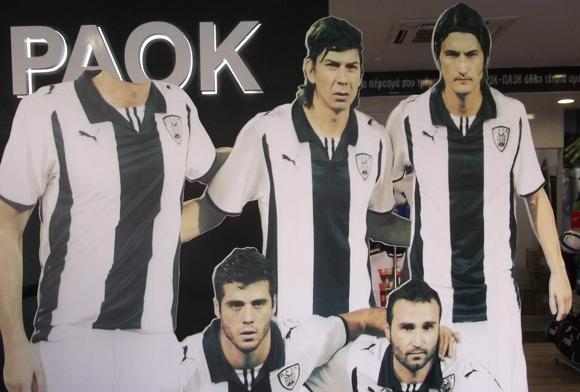
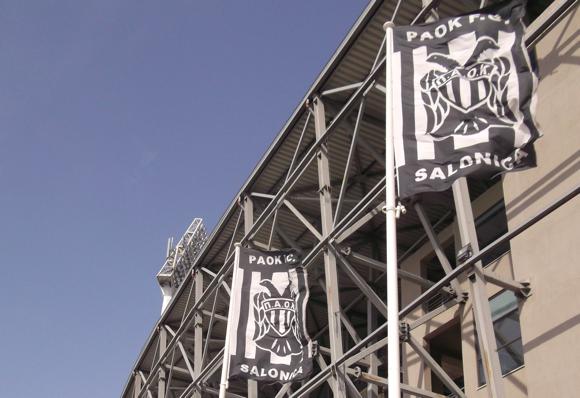
With Zagorakis now club president and Vryzas technical director, the club made savvier business decisions. On the pitch, under Fernando Santos, later to lead Portugal to the Euro 2016 title, form improved enough for the club to re-enter Europe.
Though Santos left for an ultimately miserable time as Greek national coach, PAOK had reignited and 2010-11 saw monumental European nights at the Toumba. After a dramatic 3-3 draw with Ajax, PAOK hosted a Turkish team for the first time, Fenerbahçe. In a predictably white-hot atmosphere, the Greeks took a 1-0 lead to Istanbul, where an extra-time goal from Zlatan Muslimović prompted wild celebrations over the border in Thessaloniki. A low-scoring but successful group stage led to a low-scoring defeat in the knock-out round to CSKA Moscow.
The following season, an early goal from a returning Salpingidis sank Spurs at White Hart Lane and led to another knock-out qualification, under wily old László Bölöni. With key players still being sold – Vieirinha’s departure led to Zagorakis resigning his presidency – Bölöni was unable to push PAOK to the next level.



Investment at last came in with the 2012 arrival of Greco-Russian tobacco mogul Ivan Savvidis, an associate of Vladimir Putin. A re-energised (and incentivised) side gained league runners-up spots in 2013 and 2014, Stefanos Athansiadis hitting crucial goals and PAOK coming close to a first Champions League berth. Gaining a 1-1 draw at Schalke in the play-off round, PAOK were then edged out behind closed doors at the Toumba. Group-stage progress in the Europa League led to knock-out defeat by Benfica.
Coach Vladimir Ivić, a popular figure at PAOK after his four-year stint in midfield, arrived in March 2016. Coming within two minutes of taking Ajax to extra-time at the Toumba, PAOK got through another Europa League group stage but failed to gain revenge over Schalke in the subsequent knock-out round.
More dramatic events were to follow in 2017-18 when PAOK’s rivalry with AEK Athens was taken to a whole new level. Crowd trouble had already marred the Greek Cup final win of 2017 before the two clubs found themselves in the rare position of challenging for the title the following spring.



A potentially decisive late PAOK goal being overruled after protests from AEK players, Savvidis stormed the pitch armed with a pistol he had to be restrained from using. The subsequent points deduction cost PAOK dear, AEK claiming the league crown, though the Thessaloniki side did win another cup final over their Athens rivals.
Achieving a 1-1 draw at Benfica then leading the Portuguese side 1-0 in Thessaloniki, PAOK looked set for a first Champions League group stage campaign in 2018-19, only to fall to four goals in 30 minutes. The Europa League draw then paired PAOK with Chelsea, who held on to a 1-0 lead at the Toumba.
By then, PAOK were beginning to notch up a string of wins in the league, and Răzvan Lucescu’s side would go through the season unbeaten, only drawing four games. Achieving a record 82 points, the Thessaloniki club beat all their Athenian rivals home and away, conceding only 14 goals all campaign. Between the sticks, ever-present Alexandros Paschalakis earned a long-awaited international call-up for his PAOK performances.



A former goalkeeper himself, son of legendary Romanian manager Mircea, Lucescu knew what he was doing when he passed over Argentine Rodrigo Rey for the unsung Paschalakis. Further goalkeeping heroics in the cup semi-final against Asteras Tripolis led to a final showdown with AEK Athens, the crowd limited to 1,500 invitees due to security issues at the Olympic Stadium. Former England U-21 international Chuba Akpom scored the game’s only goal to seal a memorable double in the near-empty arena.
With Lucescu lured to Saudi Arabia following a dispute with Savvidis, PAOK fell between two stools in the defence of their league crown and cup. A high-scoring thriller with old foes Ajax ended European hopes, but not before Suriname left-winger Diego Biseswar rose to the occasion with a brace at the Johan Cruyff Arena.
Way behind winners Olympiacos in the 2020-21 title race, PAOK beat the Piraeus side in the cup final before Savvidis and Lucescu buried the hatchet for the Romanian to return in the summer of 2021.
Though runners-up in league and cup, PAOK hurdled past Midtjylland on penalties and KAA Gent on aggregate to set up a fiery quarter-final with Marseille in the Conference League. Unable to contain Dimitri Payet nor take a hatful of chances in France and Thessaloniki, PAOK missed out on a first European semi-final, but Lucescu had taken them very, very close.




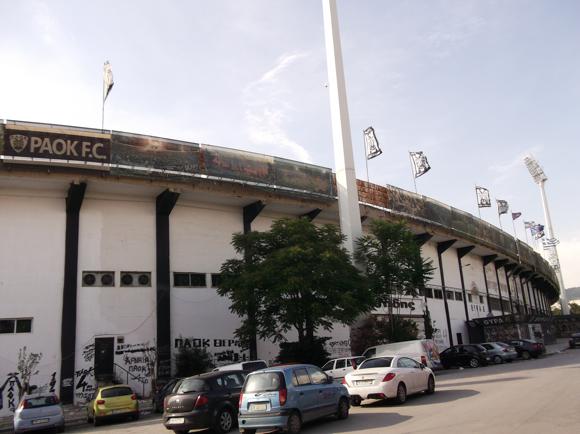
Savvidis and Lucescu remained at the helm as PAOK kept in the hunt, bolstered by two key youngsters, centre-back Konstantinos Koulierakis and attacking midfielder Giannis Konstantelias, both to earn Greek caps in 2022-23. Brushing aside Dinamo Zagreb 5-1 in the Conference League in March 2024, PAOK succumbed to Bruges in the quarter-finals.
At home, the Thessaloniki side topped the Greek Super League in the regular season and looked set for the title when two Konstantelias goals helped to edge out AEK 3-2 at the Toumba in the play-off stage. In the end, it took a 2-1 win at local rivals Aris for PAOK to seal a fourth league crown, only to be followed by an early exit at the hands of Malmö in the subsequent Champions League campaign.
In an astonishing turnaround, teenage centre-back Nils Zätterström silenced the Toumba with a stoppage-time equaliser to take the tie to extra-time, then set up the winner for his captain, Anders Christiansen. As well as tumbling into the Europa League, PAOK needed to defend their league title without key centre-back Koulierakis, sold to Wolfsburg in August 2024.
Stadium Guide
The field of dreams – and the story behind it







One of Europe’s most fearsome arenas, the Toumba Stadium is a fiery bowl of Balkan passion, whose communal use of flares has often landed PAOK in hot water with football’s governing bodies. No less an authority than Diego Maradona, whose Napoli side played here in 1988, praised the Toumba as one of the most feverish atmospheres he’d played in.
All this sizzle is produced by the PAOK fans of Fyra 4, the gate that gives access to the Curva Nord, the home end since the Toumba opened in September 1959.
Improvements before the 2004 Olympics, when the Toumba was used as a training ground, saw a four-storey office complex added to the main stand, the VIP areas significantly upgraded since the arrival of owner Ivan Savvidis in 2012.






In a nice touch that perhaps other clubs could follow, PAOK veterans have been given their own suite to watch every home game. A family area has been created in sector 7A under the scoreboard at the south end. To one side, visiting supporters are allocated sector 8 nearest the main stand. All areas but the main stand are open to the elements.
Capacity, once 45,000, and reached when PAOK were riding high in the mid 1970s, was brought down to 32,000 when the Toumba was converted to an all-seater. With security measures, this is now 28,700, a figure rarely approached except for the visits of Olympiakos, AEK and Panathinaikos, and any major European opposition.
Savvidis’ money has improved the VIP and press areas – the next step will be a complete rebuild, agreed in 2022, with Populous of Wembley and Emirates fame hired for the job. Reconstruction will mean a temporary move to the Kaftanzoglio, probably after 2024-25.
getting there
Going to the stadium – tips and timings


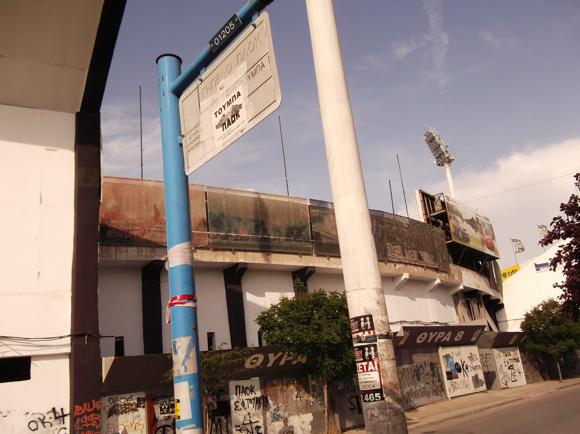
The Toumba is high up in the district of the same name – you’ll need a bus or taxi to get there.
PAOK has its own stop (ΓΗΠΕΔΟ Π.Α.Ο.Κ.) on the 12 route that sets off every 10mins (daily) from the city bus station (KTEL), passing by the train station and then the main square of Plateia Aristotelous. Journey time from the main square is around 20mins but bear in mind that on big match days, every car will be heading up the steep, winding streets to Toumba.
Alternatively, from the train station, the 14 runs along hotel lined Egnatia to reach Agia Varvara (ΑΓΙΑ ΒΑΡΒΑΡΑ) close to the stadium. The bus stop is beside a church, with a large public space next door, and the Toumba at the back of it. This route should be slightly quicker. This service also runs every 10mins daily including Sundays. The 37 runs the same route, just less frequently, every 20mins at weekends.
The stadium is also on the same side of town as the airport about 8km (five miles) away.
getting in
Buying tickets – when, where, how and how much
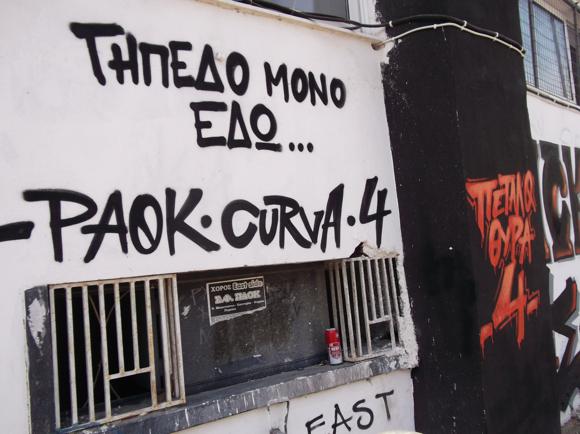
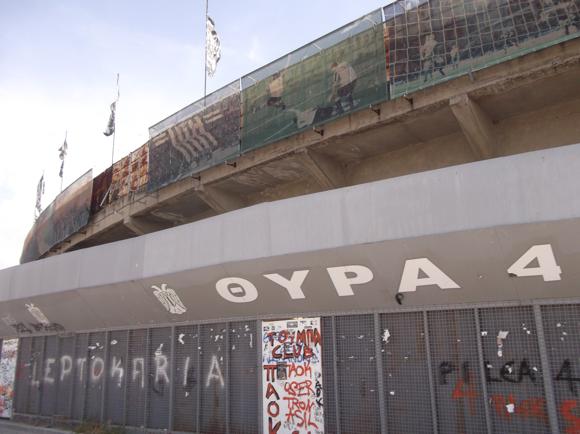


Ticket purchase requires you to provide ID, either in person or online.
Ticket windows (Mon-Fri 9am-5pm, Sat 9am-3pm, match days from 9am) on the Kleanthous side of the stadium usually start distributing on the Monday before the upcoming weekend’s game – online sales, for which you’ll need a Greek speaker, start before then. With capacity hardly ever reached, buy-on-the-day is hardly ever problematic.
Tickets are also distributed through the Ticketmaster network.
For all enquiries, contact tickets@paokfc.gr.
For top games, you’ll be paying €50 for the best seats in the main stand through Gate 1, €40 for seats either side of the halfway line (Gates 2-3), €30 for the open sideline stand opposite (Gates 5-6) and €10 elsewhere – although the home end (Gate 4) is invariably full with season-ticket holders. Prices drop by around €10 for less attractive opposition.
what to buy
Shirts, kits, merchandise and gifts





One of the largest in Greece, the club store (Mon-Fri 10am-8.30pm, Sat 10am-epm, match days) sits by the club offices at Gate 8. There’s also a mobile outlet in operation on match days.
The current iteration of the storied black-and-white stripes features black for the collar and the back of the shirt. Away strip is white with two black rings around the collar and cuffs.
Merchandise includes frappé glasses, backgammon sets, alarm clocks and candles, as well as PAOK Champions 2024 T-shirts, baseball caps and cigarette lighters.
Where to Drink
Pre-match beers for fans and casual visitors



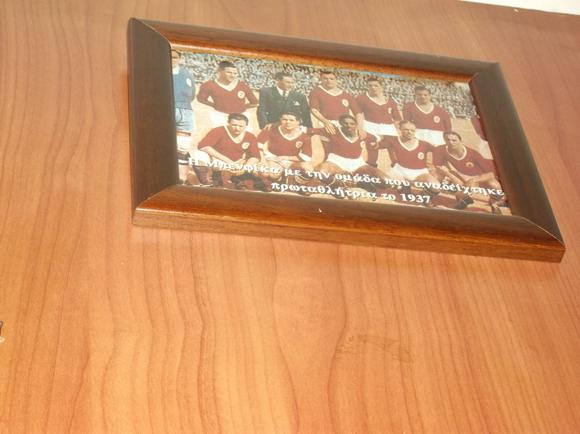



The stadium is surrounded by bars and cafés. Opened on Christmas Eve 2022, Crocodilos at the corner of Mikras Asias and Vospórou reflects the current trend for craft beer by offering 12 regularly changing draught options in a cosy, funky space. Scotland’s BrewDog and Crocodilos Bohemian are regulars. Like many places in the city, Crocodilos closes for most of August, reopening during the last week.
Nearby, Sport-Cafe Stadium Tumba at Tyrolói 10, by the corner of Vrioulon, is a popular PAOK hangout and football-watching spot serving classic grilled favourites, crowds gathered on the terrace to follow the action.
Facing Gate 4, where the streets of Praxagora and Didaskalou Vasiliou Adamidou meet, Rakómelo serves tasty small dishes from a comprehensive menu but is happy pour you a glass from the huge tap of Fischer beer on the bar counter.
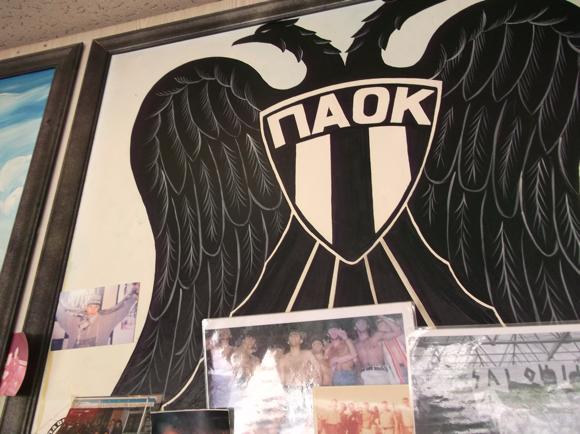

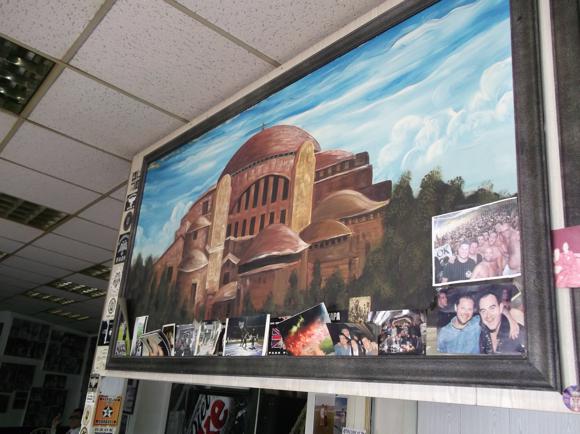









Within the stadium, by Gate 4, the PAOK fans’ bar is worth a visit any day of the week, with its striking paintings and Kodak snaps of bare-torso’ed fans getting lively. Beer prices are noticeably cheap. Home fans only on match days, of course.
Inside Gate 6, an artist has also got to work on the first-floor stadium bar, with its PAOK-designed tabletops (‘Keep The Flag High, PAOK Will Never Die’) and huge photo displays of Gate 4 in full voice.
Affordable Amstel beers keep everyone happy. It opens during the week, too, so you can trace the club’s history in photographic form across the walls of a quiet afternoon.










